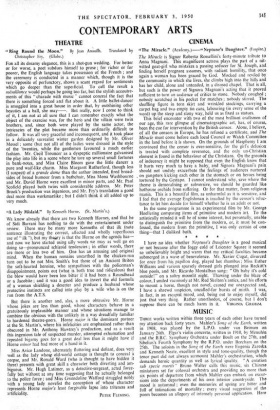"A Lady Mislaid." By Kenneth Home. (St. Martin's.) WE know
already that there are two Kenneth Homes, and that he of Sidi Barrani has nothiag to do with the entertainment under review. There may be many more Kenneths of that ilk (note sentence illustrating the correct, affected and wholly superfluous use of "ilk "), but my theary is that the Horne on the agenda has— and now we have started using silly words we may as well go on doing so—pronpunced schizoid tendencies ; in other words, there are more or less two of him. One has an amusing and original mind. When the human remains unearthed in the chicken-run turn out to be not Mrs. Smith's but those of an Ancient Briton the soft-hearted heroine, who sympathises with the policeman's disappointment, points out (what is both true and ridiculous) that the blow would have been less bitter if it had been a Roundhead or a Jacobite ; and it was a good idea to invert the old formula of a woman shielding a deserter and produce a husband whose protective instincts are called into play by a wife who is on the run from the A.T.S.
But there is another and, alas, a more obtrusive Mr. Home whose jokes are less than good, whose characters behave in a gratuitously implausible manner and whose situations manage to combine the obvious with the unlikely in a way dreadfully familiar to hardened theatre-goers. Horne major is the dominant partner at the St. Martin's, where his infelicities are emphasised rather than obscured in Mr. Anthony Hawtrey's production, and as a result this ingenious tale of suspected murder, attempted exhumation and repeated bigamy goes for a great deal less than it might have if Horne minor had had more of a hand in it.
Miss Avice Landone, alternately fluttering and defiant, does very well as the lady whop old-world cottage is thought to conceal a corpse, and Mr. Ronald Ward (who is thought to have hidden it there) presents with great skill a character both diverting and am- biguous. Mr. Hugh Latimer, as a detective-sergeant, acted force- fully but without at any time suggesting that he actually belonged to the police force ; and Miss Gwendoline Watford struggled nobly with a young lady novelist the conception of whose character represents Home major's least forgivable lapse into triteness and artificiality. PETER FLEMING.


































 Previous page
Previous page